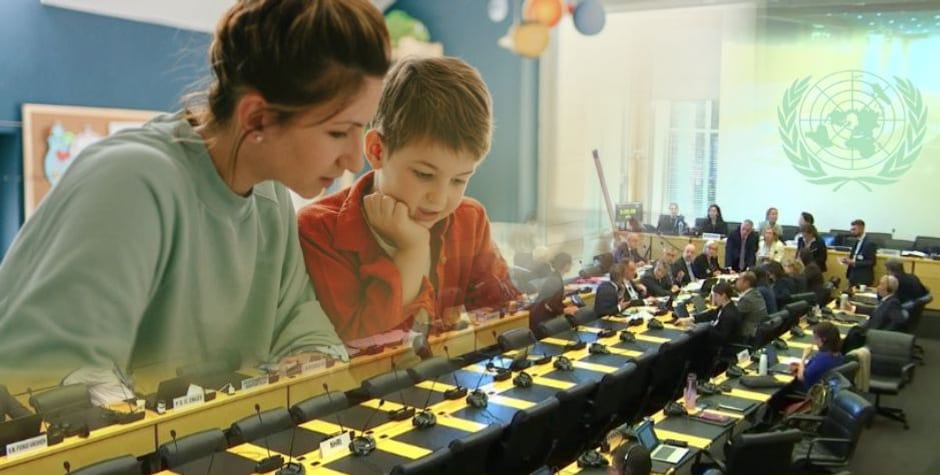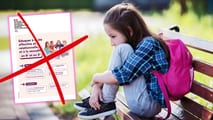

Home schooling banned in France: ECLJ refers a case to UN Committee on Economic, Social and Cultural Rights
Home schooling banned in France: ECLJ refers case to UN Committee
Home schooling, which used to be a freedom in France, now requires an authorization that is very difficult to obtain, following the adoption of a law in 2021. The ECLJ has referred the matter to a UN committee to remind France that parents are primarily responsible for the education and instruction of their children.
Home schooling in France: a brief overview
In 2024/2025, in France, home schooling is still practiced for over 30,000 children. Instead of sending children to a public or private school, home-schooling involves educating children at home, usually by one of the parents and more rarely by both or by a tutor.
While homeschooling was a fundamental freedom in France, the law of August 24, 2021, reinforcing respect for the principles of the Republic as desired by Emmanuel Macron, has drastically restricted the possibilities of continuing this form of education. This law requires children to attend a public or private school and only allows home schooling with special permission. This permission must be requested and obtained each year from the Department of Education. This is the crux of the problem for all parents who homeschool: they must justify one of the four reasons listed in the law in order to obtain the right to homeschool. In the three years since it came into force, this law has already demonstrated its harmful impact: the number of children in homeschooling has been halved.
A landmark case
It is this serious situation that the ECLJ has now brought before the Committee on Economic, Social and Cultural Rights. In an individual complaint filed on Friday, April 11, 2025, the ECLJ represents the parents of a girl who was 3 years old at the time of the events, Noémie*, and who was prevented from being home schooling with her older sister, without any justification being given to the parents.
The parents had been homeschooling for several years and had been inspected several times by school inspectors, who had found no cause for concern. Because of the decline in standards in public schools and to spend more time with their (very) young Noémie, they submitted a request to the Department of Education, in accordance with the law.
Their legal journey has been nothing short of absurd, as it has been for many other families. They first received a negative response from the Department of Education, then a second negative response from the school board's appeals committee following an administrative appeal. Then they took the case to an administrative judge, who ruled in their favor and authorized their daughter to be home schooled. However, the Ministry of Education appealed, and as the school year was coming to an end, the Administrative Court of Appeal overturned the first judge's decision and upheld the refusal to allow Noémie to be educated at home.
Except that, between March and May, the parents had reapplied for permission to homeschool Noémie the following year. And even though the case was referred to the Administrative Court of Appeal by the Department of Education, the latter authorized Noémie to be homeschooled for the following year. This makes no sense. This case is proof that the refusals or authorizations granted by the Department of Education are arbitrary and unpredictable. Many families have experienced this: incomprehensibly, some are granted permission one year but not the next, without any clear justification from the public administration.
Individual complaint to the Committee on Economic, Social and Cultural Rights
This is one of the points we raise in the complaint we have filed with the United Nations Committee. Noémie was the subject of an arbitrary and unpredictable decision. She also suffered intra-family discrimination, as her older sister was granted permission to be homeschooled, even though they are both in similar situations.
Above all, this restriction of the right to education within the family is inherently contrary to international law, and it is up to this Committee to have the courage to point this out. Indeed, Article 10 of the International Covenant on Economic, Social and Cultural Rights clearly states that:
“The widest possible protection and assistance should be granted to the natural and fundamental group unit of society, the family, particularly for its formation and while it is responsible for the maintenance and upbringing of dependent children.”
It is indeed the family that is responsible for the education of its children. If they send their children to public schools, parents voluntarily choose to delegate their authority in this matter to the State. However, the current French legal system unduly deprives parents of this responsibility. It is civil servants, who do not know Noémie or the other children, who judge on the basis of a file whether it is in the child's best interests to be educated at home or not, and who impose their choice on the parents without justification.
Furthermore, Article 13 of the same Covenant stipulates that:
“The States Parties to the present Covenant undertake to respect the liberty of parents and, when applicable, legal guardians, to choose for their children educational institutions other than those established by the public authorities [...] and to ensure the religious and moral education of their children in conformity with their own convictions.”
The new authorization system, which requires parents to justify their choice, does not, by definition, respect “the liberty of parents.”
Furthermore, while parents do have a choice of school for their children and cannot be forced to enroll their children in a public school, private schools are less widespread and sometimes very expensive. Homeschooling is sometimes the only alternative for parents “to ensure the religious and moral education of their children in accordance with their own convictions.”
Consequently, if the right to home schooling is not guaranteed, parents are effectively forced to send their children to public schools whose teaching is not necessarily in line with their beliefs. This is essentially what the ECLJ is arguing in its individual application on behalf of Noémie.
We ask the Committee to condemn France for violating Noémie's freedom and right to education, which is certainly better guaranteed by her parents than by the French public school system.
However, it will be difficult to obtain a quick decision from this Committee against France, as it has many requests before it. It is primarily up to members of Congress and senators to act to guarantee parental rights, and we hope that this petition will contribute to this effort. To this end, the ECLJ invites parents who have been unsuccessful in the national courts and wish to take action before this UN body to contact us.
* Name changed.












